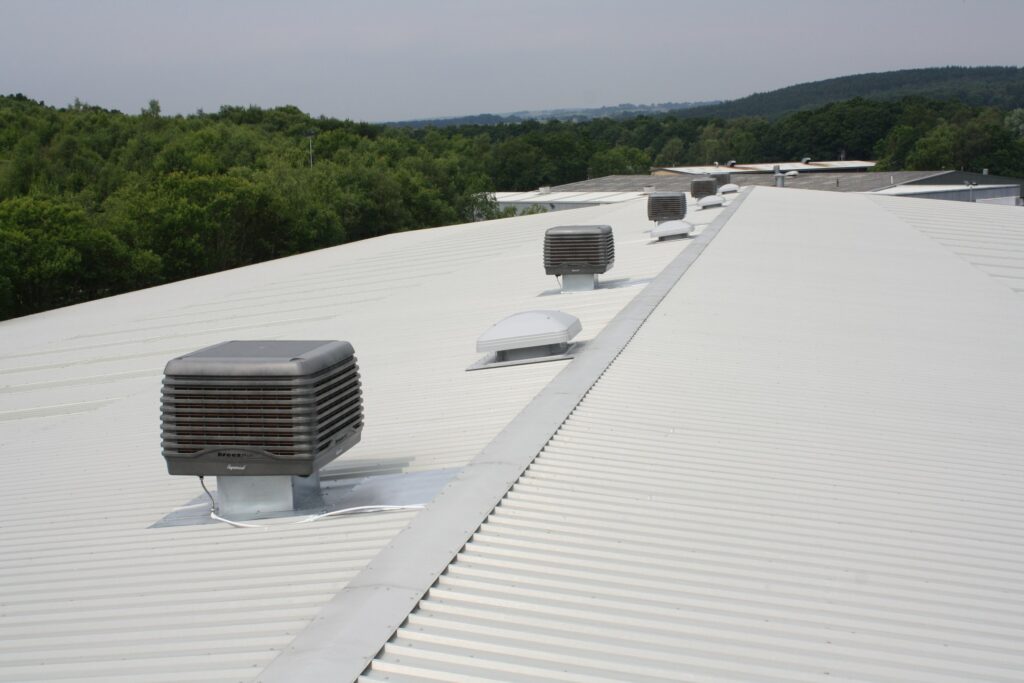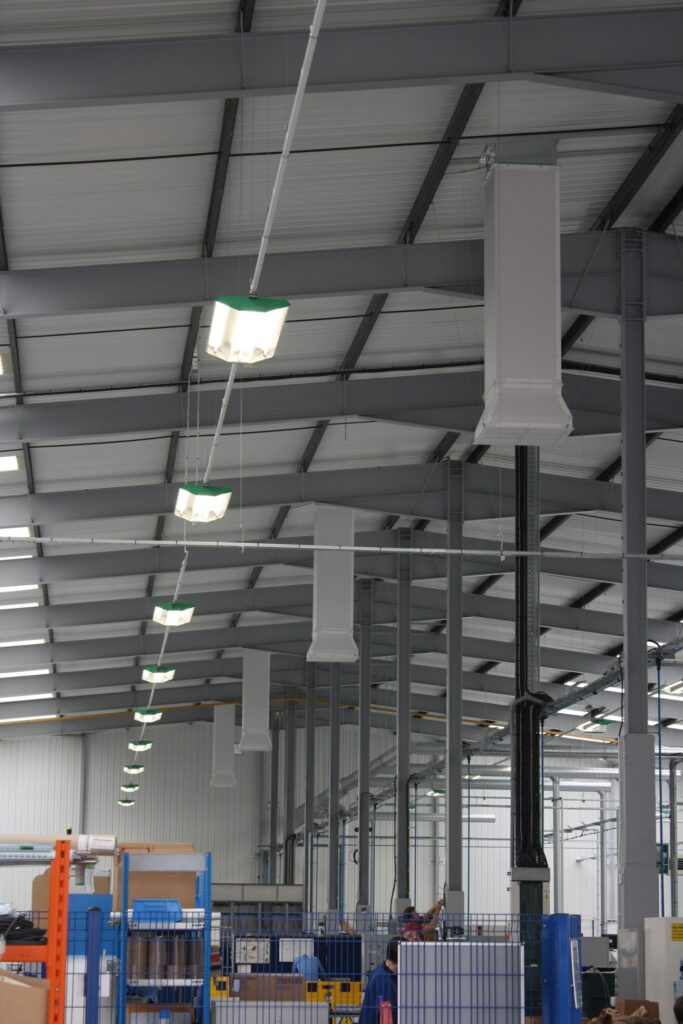Nick
23/02/2023
As the world faces the challenges of global warming and energy conservation, finding energy efficient and cost effective warehouse cooling solutions for large industrial spaces, becomes more critical than ever. Traditional air conditioning systems are often not viable options for cooling vast areas. This is because of their high capital and running costs. Evaporative cooling is an environmentally friendly and economically beneficial alternative. In this blog, we will delve into the various benefits of evaporative cooling systems. We will get an understanding of why they are the most energy efficient and sustainable choice for cooling warehouses.
Evaporative cooling systems, particularly those offered by industry leaders are at the forefront of energy efficient cooling technologies. By harnessing the power of natural water evaporation, these coolers eliminate the need for chemical refrigerants. This makes them environmentally friendly and safe for the planet. When compared to conventional refrigerant based AC units, evaporative coolers can be up to 90% more efficient. These systems operate using 100% fresh air. This significantly enhances indoor air quality and creates a healthier, more comfortable environment for occupants.
The financial benefits of adopting evaporative cooling as a warehouse cooling solutions are equally impressive. These systems can function using a mere 10% of the cost associated with traditional air conditioning, both in terms of initial investment and ongoing operational expenses. In large warehouses with expansive floor spaces, the potential savings on cooling costs can be staggering, reaching up to 90%. For businesses seeking to optimise their cooling solutions while minimising environmental impact and financial outlays, evaporative cooling proves to be the optimal choice.

The fundamental principle behind evaporating cooling systems centres on water evaporation. Fresh outdoor air is drawn through cooling pads that have been saturated with water. As the warm air passes through these damp pads, the water evaporates, absorbing heat from the air and effectively reducing its temperature. The cooled air is then distributed throughout the building. This creates a refreshing and comfortable indoor environment for workers and stored goods alike.
One notable advantage of evaporative cooling systems is their ability to operate in ventilation only mode during cooler periods. This mode allows for free cooling, further reducing energy consumption. Unlike conventional refrigerated systems that require a large compressor, evaporative air conditioners demand significantly less electricity. This feature makes them a practical and cost effective cooling solution for warehouses and other large industrial spaces.
Despite its impressive benefits, evaporative cooling has faced some misconceptions that deter businesses from adopting this innovative technology. One such concern is the notion that evaporative coolers are not suitable for humid climates. However, modern evaporative cooling units are specifically designed to perform well, even in humid conditions. These systems can guarantee comfort cooling and effectively reduce humidity when required.
A common misconception that is widely spread suggests that airborne mist is created by evaporative coolers. Contrary to this belief, evaporative cooling systems work through water evaporation and energy exchange, resulting in only a marginal humidity increase. The air movement generated by the system also helps maintain optimal indoor comfort by regulating both humidity and temperature levels.

Evaporative cooling systems offer benefits that go beyond energy efficiency and cost savings. They also offer significant health and environmental benefits. Unlike refrigerated air conditioning systems that recirculate indoor air, evaporative coolers supply 100% fresh, filtered air into the building. This not only enhances indoor air quality but also supports the well-being of occupants by reducing exposure to contaminants and pollutants.
Evaporative cooling units contribute to better ventilation by never recirculating stale air, lowering the risk of virus and germ circulation. The systems also provide essential moisture that the human body requires, making them beneficial individuals with conditions such as asthma. By using water instead of chemical refrigerants, evaporative cooling systems are inherently environmentally friendly, reducing the consumption of fossil fuels in electricity production.
Some individuals may question the effectiveness of evaporative cooling in the relatively humid climate of the UK. However, as we examine the principles of evaporation cooling, we find that its performance remains outstanding, even in such conditions. Evaporation takes place when the outdoor humidity is below 100%, and the air absorbs water. The combination of temperature and humidity creates human comfort, and evaporative air coolers are specifically designed to create these comfortable conditions.
As temperatures rise during hot periods, relative humidity decreases. It is during these warm times that oolong becomes most essential, and evaporative coolers excel in these conditions, as the relative humidity is lower. These peak cooling periods usually correspond to working hours, making evaporative cooling systems ideal for warehouses and factories that require optimal cooling during active operation.
Evaporative coolers draw fresh air from the outdoors and allow hot, humid air to escape through doors, windows, or mechanical extraction systems. This natural flow of fresh air contributes to maintaining comfortable indoor conditions.
With the current global focus on sustainability and reducing carbon footprints, the environmental impact of cooling systems is a crucial consideration. Evaporative cooling stands out as a remarkably green and sustainable choice. By relying solely on water for cooling and eliminating chemical refrigerants, evaporative cooling systems eliminate the release of harmful CFCs (chlorofluorocarbons), HFCs (hydrofluorocarbons), and HCFCs (hydrochlorofluorocarbons) into the atmosphere.
Evaporative cooling units consume far less electricity compared to conventional refrigerated systems. This reduced energy demand translates to decreased consumption of fossil fuels, such as coal and natural gas. These fuels are often used in electricity production. By adopting evaporative cooling, businesses contribute to energy conservation and actively take part in reducing their environmental impact.
Beyond energy efficiency, cost savings, and environmental benefits, evaporative cooling offers several other advantages that make it an attractive choice for cooling warehouses:
Evaporative cooling emerges as the most energy-efficient, cost-effective, and environmentally friendly method for warehouse cooling solutions. With substantial energy and cost savings, improved indoor air quality, and health benefits, businesses can rely on evaporative cooling systems to maintain optimal environmental conditions and enhance productivity. Embracing this innovative technology offers a greener and more sustainable future, as companies actively contribute to reducing their carbon footprint. They also promote responsible cooling practices. By cooling their warehouses with nature’s